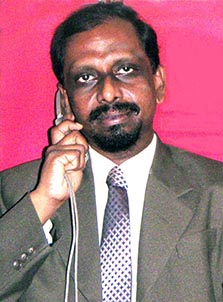Companies Only Pay for Viable Solutions
IdeaConnection Interview with a Problem Solver
Charles John Bhaskar is Managing Director of GeoMarine Biotechnologies (P) Ltd, a biotechnology research company with a focus on research, education and training, especially in marine biotechnology. He is one of the three innovation specialists in India and the first person in his country to commercialize indigenous probiotics in Aquaculture.
 Science and innovation have been powerful passions throughout his life and stretch back to his childhood. In his own words “innovation is my cup of tea.” When he was 12 he came up with a method for the preservation of live fish to maintain their flavour, and make transportation easier. It involved slowly freezing the animal then reviving it at a future date. Although his resources were limited the approach worked well for a few days.
Science and innovation have been powerful passions throughout his life and stretch back to his childhood. In his own words “innovation is my cup of tea.” When he was 12 he came up with a method for the preservation of live fish to maintain their flavour, and make transportation easier. It involved slowly freezing the animal then reviving it at a future date. Although his resources were limited the approach worked well for a few days.And today this biotechnologist and biochemist with a PhD in biological sciences has about 50 product technologies to his credit, and he mentors and guides young innovators. He relishes a challenge and spoke to IdeaConnection about his experience as a problem solver.
I just happened to land on the IdeaConnection website and then it was really exciting to see what they were doing. It looked like a good thing, and it is international too.
At the time of speaking I have worked on two challenges, and we won one of those.
(Ed. note: As of Dec-2010, Charles has won four challenges.)
How long did it take the group to come up with a solution?
To be very frank we did it in one week.
What did it feel like when you found out that you had solved the challenge?
It was quite exciting.
What is the benefit of having a number of brilliant people working on a challenge as opposed to an individual operator trying to solve it?
It is very simple. Instead of one brain, you have many brains. Each one can approach the task from a different angle. There are experts from different fields who have their own particular point of view, but we all come together to devise a strategy and work toward a solution. Sometimes we agree on some things, sometimes we don’t agree, but we refine the discussions, and everyone gains in this.
Thinking differently is a must. I would say that if a person is a biologist he should not look at a solution just from a biologist’s perspective. One needs to keep the mind open and keep thinking about the problem as the solution might come from anywhere.
But let me tell you the best teacher of innovation is nature. I always try to copy nature, it gives great inspiration. I feel there is an answer for everything in nature. We need to look at nature rather than do something with the human mind alone. For many complicated problems the solution can be simple.
What do you feel you have gained from the experience of working on challenges with IdeaConnection?
Actually I gained a lot of experience in how to work in this kind of team with people from different backgrounds and different cultures.
The facilitator is a really wonderful idea. I never even knew our facilitator was a psychologist and not a technical person in our area. I only came to know this recently when he mentioned it. We thought he was an expert. This demonstrates how well he was guiding the discussions and the group. It was wonderful.
Did you find the challenges difficult or easy?
They were not very difficult. I was comfortable all the time.
Before you start a challenge do you have an idea of what the solution might be?
Yes, I do have.
Is that important?
It is important, but as an innovator I would say that whatever idea a person has he should not think that is the end of it. Because it can give you a kind of bias, and when you are working in a team you might think your idea is the greatest and be carried away by it. But it should not be like that. It should be a guiding force.
So when you have a good idea you should still be flexible with it?
Yes, exactly. Every scientist should be unbiased.
Overall, what are your thoughts about IdeaConnection?
The idea itself is wonderful. Companies can definitely benefit from it. I am one of the three innovation specialists in India, and I have also been an innovation trainer for many youngsters. I have always been saying that innovation doesn’t necessarily come from the employer or the employees.
A company has to pay a person whether he innovates or not, whereas with open innovation a company can say we will pay you so much if you solve our problem. So I think this is a wonderful idea. A company doesn’t have to keep an office for people or pay them any fringe benefits; it just pays for sensible and viable ideas.
